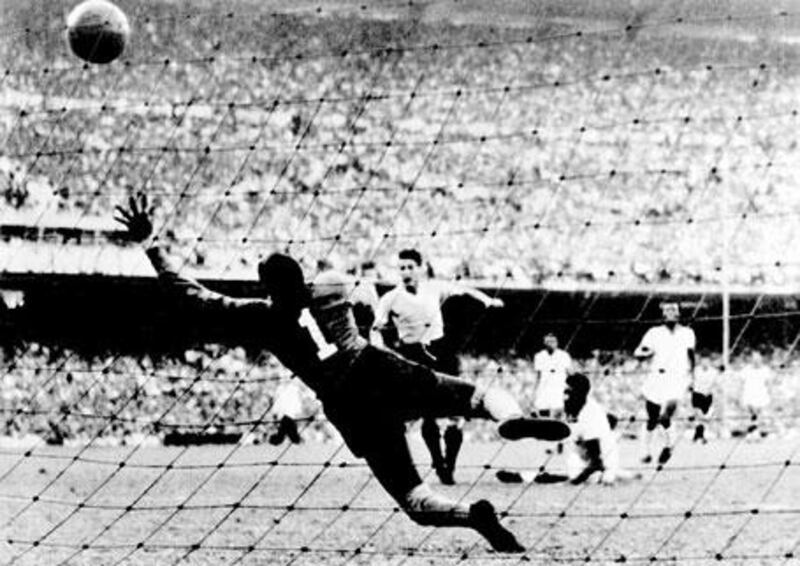Every time Brazil are knocked out of a World Cup there is a palpable air of sadness, like a death in the family. But in 1950, when they lost on home ground, that feeling was multiplied many times over. A decade ago, when I used to write a column for the Rio Jornal dos Sports, a lovely old man called Osmar was in charge of the paper's archives. He had been in the vast crowd in the newly built Maracana stadium on that fateful July 16, when Brazil were beaten by Uruguay, and he found the experience so painful he never went back.
As so often with football, it went much deeper than sport. Brazil had been proclaimed "the country of the future". The 1950 World Cup was the moment when they were going to announce their arrival in the present. There were solid reasons for optimism. Brazil had a wonderful team, with the talented Zizinho - Pele's idol - and Jair making the bullets for centre forward Ademir to fire. The crowds flocked to the Maracana, which, like giant flying saucer parked the edge of the city centre, was a potent symbol of Brazil's ambitions to gatecrash the modern world.
For the only time in the competition's history, there was no one-off final. Instead, there was a pool of four teams. Brazil crushed Sweden 7-1 and Spain 6-1. Uruguay were held by Spain and beat Sweden 3-2. So on July 16, Brazil needed just a draw to win the trophy for the first time. Before the game the mayor of Rio proclaimed the Brazil team as world champions - dangerous talk. Form may not have been on Uruguay's side, but pedigree was - they had never lost a World Cup match. Once the game kicked off they frustrated the hosts, till falling behind to a goal from right winger Friaca early in the second half.
But it was the start of the end for Brazil. Many years later Zizinho told me: "When we scored our team stopped playing. We had a collective drop in pressure, it seemed that we had carried out our duty in the game." Uruguay's right winger Ghiggia found a gap in the Brazil defence. Flavio Costa, Brazil's coach, told me that "a defender" - he was referring to Juvenal - "wasn't giving cover to the marking of Ghiggia. Perhaps he was worried about the crowd. He hid from the game in the middle of the others".
And Ghiggia kept beating full back Bigode. Once he pulled back a cross for Schiaffino to equalise. The draw still favoured Brazil, but as Flavio Costa recalled: "There was a silence in the Maracana which terrified our players." An estimated crowd of 172,772 went quieter still when Ghiggia burst through again. Keeper Barbosa edged across his goal, anticipating another cross, but was beaten by a shot to his near post.
The Brazil team woke up, frantically applied some late pressure, but right on the 90 minutes - no injury time - the English referee blew his whistle and Uruguay were champions. Silently and tearfully the crowd moved away. In manic depressive style, the nation that had been prepared to celebrate their rise instead turned on themselves. Brazilians, it was said, were a mongrel race lacking in morale fibre, with special blame apportioned to the black players.
This racial nonsense was largely overcome eight years later when, with black players such as Didi and Pele and the Indian-descended Garrincha, Brazil won their first World Cup in Sweden. But those who played on July 16 had real problems living down the famous defeat. Zizinho wrote his autobiography fuelled by bitterness: "I played 19 years, won a few titles but I'm remembered, together with my teammates, as a loser."
In the long term, though, the 1950 World Cup gave Brazilian football much more than an exceptionally painful defeat. In a country the size of a continent, it did a great deal to take football beyond the traditional centres of Rio and Sao Paulo. A new stadium was built in Belo Horizonte (where England lost to the USA), and matches were also staged in Porto Alegre and Curitiba in the South and Recife in the North-East.
These were important steps on the way to the establishment of a genuinely national championship, which began in 1971. In 2014 the World Cup returns to Brazil, with the aim of improving the stadiums and spreading the game to cities such as Manaus and Cuiaba which lack well established professional teams. One thing remains the same. The pressure on the home side to win will be immense - with the difference that in 1950 a population of 51.7 million Brazilians were demanding victory. By 2014 there will be nearly 200 million.
tvickery@thenational.ae





